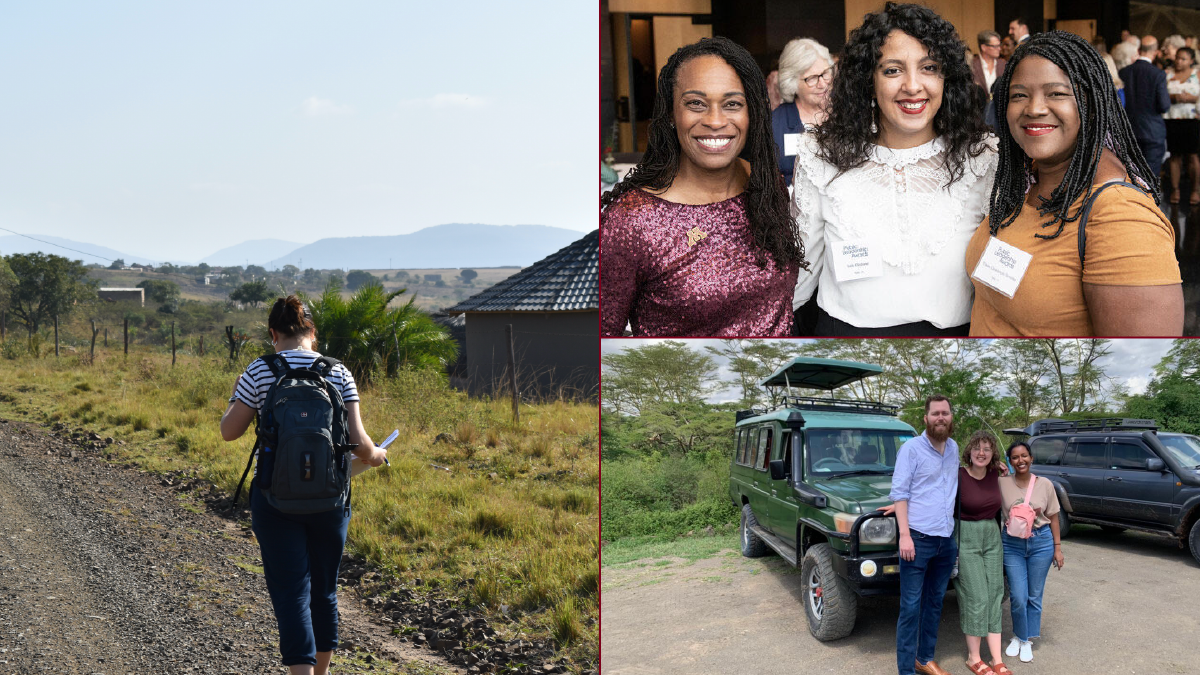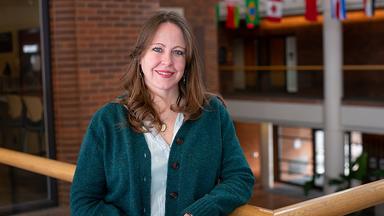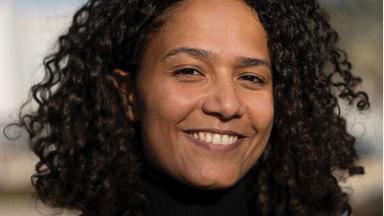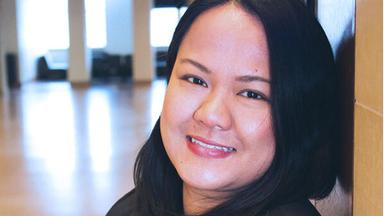The Master of Development Practice (MDP) program prepares young professionals for careers in sustainable development—globally, locally, and in the complex realities in between.
A strategic blend of training in theory and practice equips MDP graduates with knowledge, skills, and competencies essential to appropriate and effective engagement with the broad coalitions addressing society’s complex sustainable development challenges. Poverty and inequalities, social and environmental justice, and the causes and effects of a rapidly changing climate are a few of the thematic areas toward which our alumni gravitate.
The interdisciplinary MDP degree features training across the University, with courses in public policy, public health, education, and the natural and social sciences. This distributed approach fosters the integration of knowledge that is necessary for addressing the grand and systemic challenges confronting society and the development professions. Our MDP experience centers on engagement. Student inquiry and action typically begin with challenges framed by local and global partners, with engaged learning experiences occurring through campus-based coursework, field-based summer placements,* a culminating capstone project, and a variety of co-curricular opportunities.** (see more below)
Minnesota’s MDP program is a member of the MDP Global Association, which is part of the Sustainable Development Solutions Network’s (SDSN) Sustainable Development Academy. Our program is a cooperative, interdisciplinary endeavor comprising faculty from six collegiate units at the University of Minnesota. MDP faculty work both locally and globally, and with notable partnerships and extensive experience in Colombia, Guatemala, Tanzania, Kenya, South Africa, Egypt and the Middle East / North Africa region. The Minnesota MDP program is jointly administered by the Humphrey School of Public Affairs and the Interdisciplinary Center for the Study of Global Change (ICGC).
Class profile and career statistics
MDP Class Profile: 2023-24
- Incoming Students: 9
- Minnesota Residents: 22%
- International Students: 56%
- Gender: Female: 56%, Male: 44%
- Domestic Students of Color: 22%
- Average Age: 32
- Average GPA: 3.38
- Average GRE Verbal Percentile: 73%
- Average GRE Quantitative Percentile: 57%
- Percent of Class total: 5%
MDP Career Statistics: Class of 2022
8 graduated, 8 known reported (100%)
- Known employed or continuing to further degree: 88%
- Actively job seeking: 13%
- Government employment:12%
- Nonprofit employment: 25%
- Private sector employment: 38%
- Academic staff: 12%
Prospective applicants: please note that all applications are reviewed holistically, and profile numbers should not be viewed as admission cutoffs. Please contact the Office of Admissions with any questions about candidacy.
Note: These numbers reflect the most recent data available; due to rounding, percentages may not always add up to 100 percent.
Curriculum
The Master of Development Practice requires 50 semester credits, including 43.5 credits in interdisciplinary required courses and a 3-credit capstone workshop. The remaining credits are taken in elective courses. An intensive two–week development practice orientation and an international field experience also are required.
REQUIRED CORE COURSES
- MDP 5001 Ways of Knowing for Sustainable Development
- MDP 5002 Program Development Workshop
- MDP 5004 Summer Field Experience
- MDP 5005 Qualitative Methods for Development Practice
- MDP 5100 Post-Field / Pre-Capstone Seminar
- MDP 5200 Capstone Workshop in Development Practice
- AGRO 5321 Ecology of Agricultural Systems
- PA 5031 Statistics for Public Affairs or PA 5045 Statistics for Public Affairs, Accelerated (4cr.)
- PA 5501 Theories & Policies of Development
- PA 5503 Economics of Development
- PA 5521 Development Planning & Policy Analysis
ADDITIONAL SKILLS COURSE OPTIONS
- PA 5003 Introduction to Public Financial Analysis & Management; or
- PA 5032 Applied Regression (recommended concurrent with PA 5521); or
- PA 5046 Econometrics for Public Policy (4cr.); or
- PA 5311 Program Evaluation; or
- OLPD 5501 Principles and Methods of Evaluation; or
- EPSY 5243 Principles and Methods of Evaluation
EDUCATION AND SUSTAINABLE DEVELOPMENT
- OLPD 5103 Comparative Education (3 cr); or
- OLPD 5104 Strategies for International Development Education; or
- OLPD 5107 Gender, Education & Development
SUSTAINABILITY SCIENCE
A minimum of 3 credits must be taken from the Socio-Ecological subgroup. The remaining 3 credits may be taken from EITHER the Socio-Ecological or the Socio-Political subgroup.
Socio-Ecological
Take a minimum of 3 credits from the Socio-Ecological course group:
Complete course(s) and earn 3 or more credit(s) from the following:
- ESPM5251 - Natural Resources in Sustainable International Development (3cr.)
- FNRM5411 - Managing Forest Ecosystems: Silviculture (3cr.)
- PA5724 - Climate Change Policy (3cr.)
- AGRO5321 - Ecology of Agricultural Systems (3cr.)
- GCC5008 - Policy and Science of Global Environmental Change (3cr.)
- EEB5534 - Biodiversity Sci: The origins, maintenance, consequences, detection and assessment of biodiversity (3cr.) Environment
- GEOG5401W - Geography of Environmental Systems and Global Change (3cr.)
- GCC5032 - Ecosystem Health: Leadership at the intersection of humans, animals and the environment (3cr.)
- PA5242 - Environmental Planning, Policy, and Decision Making (3cr.)
- PA5751 - Addressing Climate and Energy Challenges at the Local Scale (3cr.)
- PA5761 - Environmental Systems Analysis at the Food-Energy-Water Nexus (3cr.)
Socio-Political
- PA5531 - Global Sustainable Development in Practice (3cr.)
- GCC5017 - World Food Problems: Agronomics, Economics and Hunger (3cr.)
- APEC5831 - Food and Agribusiness Marketplace (2-3cr.)
- LAW6709 - Agriculture and the Environment (2cr.)
LEADING CHANGE FOR SUSTAINABLE DEVELOPMENT
- PA5101 - Management and Governance of Nonprofit Organizations (3cr.)
- PA5771 - Change Leadership for Environmental, Social and Governance Action (3cr.)
- ESPM5202 - Environmental Conflict Management, Leadership, and Planning (3cr.)
- GCC5031 - The Global Climate Challenge: Creating an Empowered Movement for Change (3cr.)
- GCC5032 - Ecosystem Health: Leadership at the intersection of humans, animals and the environment (3cr.)
- PA5011 - Dynamics of Public Affairs Organizations (3cr.)
- PA5144 - Social Entrepreneurship (3cr.)
- PA5151 - Organizational Perspectives on Global Development & Humanitarian Assistance (3cr.)
GLOBAL HEALTH
- PUBH 6108: Foundations of Global Health (2 cr); or
- PUBH 6320 Fundamentals of Epidemiology
You may be exempted from selected core course requirements if you have relevant prior coursework. In that case, you can take additional elective credits to meet the 50-credit requirement.
Program Planning Worksheet
The Program Planning Worksheet (PPW) helps current students plan their degrees from start to finish. Students must submit a completed and approved PPW before graduating.
Capstone Workshop (3 credits)
Capstone Workshops are designed to provide a learning opportunity for MDP students in their second year to apply their knowledge through a client-based team project.
International Field Experience
Students are required to complete a 10-week (400 hours) international field experience, which will include professional work and academic cross-cultural training. Students will complete the field experience during the summer between the first and second year of the program.
ELECTIVES (TO BRING TOTAL DEGREE CREDITS TO AT LEAST 50)
- ANTH8120 - Problems in Culture Change and Applied Anthropology (3-6cr.)
- ENTR6025 - Introduction to Entrepreneurship (2cr.) Online may be available
- ESPM5061 - Water Quality and Natural Resources (3cr.)
- ESPM5108 - Ecology of Managed Systems (4cr.)
- ESPM5604 - Environmental Management Systems and Strategy (3cr.)
- GEOG5385 - Globalization and Development: Political Economy (4cr.)
- GEOG5561 - Principles of Geographic Information Science (4cr.)
- HORT5071 - Ecological Restoration (4cr.)
- OLPD5011 - Leading Organizational Change: Theory and Practice (3cr.)
- OLPD5048 - Cross-Cultural Perspectives on Leadership (3cr.)
- OLPD5104 - Education and the Sustainable Development Goals (3cr.) Online may be available
- OLPD5502 - Comparative evaluation theory for practice (3cr.) Online may be available
- OLPD8101 - International Education and Development (3cr.) Online may be available
- OLPD8596 - Evaluation Internship (1-9cr.)
- PA5105 - Integrative Leadership: Leading Across Sectors to Address Grand Challenges (3cr.)
- PA5136 - Group Process Facilitation for Organizational and Public/Community Engagement (1cr.)
- PA5137 - Project Management in the Public Arena (1.5cr.)
- PA5144 - Social Entrepreneurship (3cr.)
- PA5190 - Topics in Public and Nonprofit Leadership and Management (1-3cr.) Topics Course
- PA5251 - Strategic Planning and Management (3cr.)
- PA5271 - Geographic Information Systems: Applications in Planning and Policy Analysis (3cr.)
- PA5301 - Population Methods & Issues for the United States & Global South (3cr.)
- PA5405 - Public Policy Implementation (3cr.) Online may be available
- PA5504 - Transforming Development (3cr.)
- PA5522 - International Development Policy, Families, and Health (3cr.)
- PA5561 - Gender and International Development (3cr.)
- PA5601 - Global Survey of Gender and Public Policy (3cr.)
- PA5622 - GAINS: Gender and Intersectional Network Series, Leadership Workshop I (0.5-1cr.)
- PA5623 - GAINS: Gender and Intersectional Network Series, Leadership Workshop II (0.5-1cr.)
- PA5721 - Energy Systems and Policy (3cr.)
- PA5801 - Global Public Policy (3cr.)
- PA5825 - Crisis Management in Foreign Affairs (1.5cr.)
- PA5890 - Topics in Foreign Policy and International Affairs (0.5-5cr.) Online may be available, Topics Course
- PA5910 - Developing Your Public Service Career (1cr.)
- PA5926 - Presentation Skills: How to Inspire Your Audience and Change the World (1cr.)
- PA5927 - Effective Grantwriting for Nonprofit Organizations (1.5cr.) Online may be available
- PA5928 - Data Management and Visualization with R (1.5cr.)
- PA5929 - Data Visualization: Telling Stories with Numbers (2cr.) Online may be available
- PA8302 - Applied Policy Analysis (4cr.)
- PA8991 - Independent Study (0.5-4cr.)
- PUBH6102 - Issues in Environmental Health (2cr.) Online may be available
- PUBH6815 - Community-based Participatory Research (2cr.) Research
- PUBH6845 - Using Demographic Data for Policy Analysis (3cr.)
- PUBH6933 - Public Health Nutrition for Adults (2cr.)
Summer Field Experiences
The required field experience is an opportunity at the end of the first academic year for MDP students to develop and apply new competencies, skills and knowledge through a client-based, team project in the field, typically internationally. Each student team will be matched with a NGO, public or private sector client engaged in some dimension of sustainable development. While the specifics of each project vary, all will include some degree of project design, in-depth research, analysis and the creation of a final, professional deliverable suited to client needs and expectations. The field placement typically occurs over 10 weeks.
Co-curricular Experiences
MDP students have a range of co-curricular options at the Humphrey School including the Public Affairs Student Association (PASA); school affinity groups such as the Humphrey International Student Association (HISA), the Gender, Sexuality, Policy and Event Committee (GSPEC) and the Humphrey Students of Color Association (HSOCA); and finally, University student groups such as the Interdisciplinary Perspectives on International Development (IPID). In addition, many students participate in the Minnesota International NGO Network (MINN). The University also features numerous thematic case competitions like the Global Health Challenge and Moving the Cities and sends delegations to multi-national summits like the Climate Council of Parties (COP). These experiences extend the curriculum in meaningful and interesting ways by fostering networking, skill-building, and practical engagement beyond academics.




